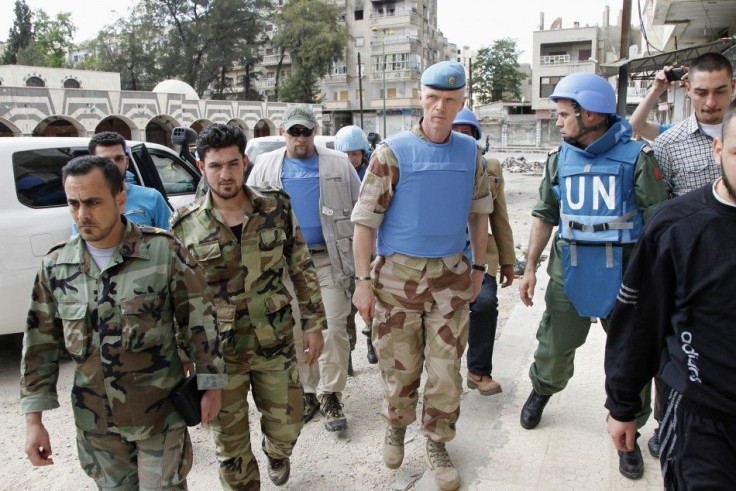Monitors Not Enough To End Violence In Syria, More Dialogue Needed: U.N. Mission Chief

Speaking from Damascus on Friday, a leader of the United Nations observer mission in Syria said the U.N. monitors' presence alone would not be enough to stop the ongoing violence there.
General Robert Mood of Norway told reporters that no volume of observers can achieve a progressive drop and a permanent end to the violence if the commitment to give dialogue a chance is not genuine from all internal and external actors, according to Al Arabiya.
His comments come ten days after Kofi Annan, a specially-appointed envoy who brokered a tenuous peace plan agreement with Syrian forces, argued that the U.N. supervision mission is possibly the only remaining chance to stabilize the country.
The Syrian conflict first erupted in March of 2011, following brutal government crackdowns on civilian protests. Syrian President Bashar al-Assad has suppressed the rebellion, sending military forces to crush uprisings across the country.
The resistance formed a loosely-organized Free Syrian Army, which the Assad regime dismisses as a group of terrorists backed by foreign powers. The ongoing conflict between Assad's military and the determined resistance movement has grown increasingly severe over the past 15 months. Actors on both sides have so far been unwilling or unable to engage in sustained dialogue to resolve the conflict as Mood recommends.
Annan's six-point peace plan was agreed to by the Assad regime and representatives of the Free Syrian Army on March 27. In accordance with the plan, the first U.N. monitors arrived in the country on April 16. Today, there are 260 observers making patrols.
Despite their presence and a nominal ceasefire implemented on April 12, violence and protests continue to plague the country.
U.N. monitors themselves came under attack on Tuesday while their vehicle trailed a funeral procession, according to the Syrian Authority for Human Rights. No monitors were killed in the attack, although there are reports of up to 20 Syrians losing their lives.
On Friday, Syria saw what some activists are calling the largest public demonstration since the uprising began fifteen months ago. Thousands rallied in Aleppo, a northern city that had been mostly loyal to the regime until this month. Protesters were fired upon by Syrian forces, who used both tear gas and live ammunition, according to AP.
Friday clashes were also reported in the cities of Homs and Rastan.
In this environment, public opinion regarding the U.N. mission is quickly souring. One activist, Omar Hamza, told the L.A. Times that the observers' presence had not delivered the peace many had hoped for.
When they visit a town or an area, shortly after it is stormed, people are detained, and army opens fire. People started praying that the observers don't visit their area, he said.
On Friday, Mood acknowledged criticism of the mission but pointed to a lack of other options.
If it is anything that the Syrian people do not deserve, it is another alternative that would lead to more violence, he said. So I have yet to be convinced ... by anybody that they have a good alternative.
In total, the U.N. estimates that more than 9,000 people have been killed since the Syrian uprising began last year.
© Copyright IBTimes 2025. All rights reserved.






















